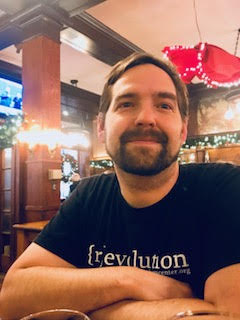 Matt Sadler is the author of The Much Love Sad Dawg Trio (March Street) and Tiny Tsunami (Flying Guillotine). He is a poetry editor at Versal and lives in the suburbs of Detroit with his wife and kids.
Matt Sadler is the author of The Much Love Sad Dawg Trio (March Street) and Tiny Tsunami (Flying Guillotine). He is a poetry editor at Versal and lives in the suburbs of Detroit with his wife and kids.
His poem, "Jaws," appeared in Issue Eighty-Two of The Collagist.
Here, he speaks with interviewer Angela Redmond-Theodore about movies, philosophy, and his multi-faceted writing life.
The descriptions you present in “Jaws” are so detailed and precise. At the same time, each stanza offers the poem a layer of mystery, similar to the passes made by the great white shark in the movie Jaws. How did this poem come about?
I was writing a series of poems trying to pull themes out of classic and contemporary film and examine the themes in the bare light of day, but explore them using imagery specific to the film. I had a lot of fun watching movies each night for a couple months and writing as I watched. The resulting manuscript produced quite a few published poems, and I’m glad the Collagist took this one!
I’m intrigued by the widening shifts in perspective between the personal characterizations—you, we, and the living—that lead the reader through the poem. This creative move is as philosophical as it is literary. Would you speak to the place of philosophy in your work and in the work of poets and poetry, generally speaking?
To me, philosophy is central to poetry. I’m always looking for the perspectives and ideals present underneath the poems I’m reading, beyond the initial sonic and emotional experience of reading the poem (perhaps this is a symptom of teaching English and philosophy in a high school?). When I write, I sometimes start with the philosophical ideal, but just as often I let it develop organically as I write, then hone it in revision.
Parables are instructions passed on by means of story, leading the hearer/reader from a starting point to a surprise destination. The structure of “Jaws” is parabolic: we begin in the sun and end up in the dark. What lesson(s) has this poem taught you?
For this poem, I was fascinated by the idea that we literally travel to the places we fear and drop fishing lines into the depths, that we’re dependent on those very depths that haunt us in both imagination and reality, that our “light” exists side by side with our “darkness”. This happens in the movie on the fishing boats and beaches, and it exists with every institution humans manage to create. And I tried to leave this poem vague as to whether the end is going to be happy, so we just have to accept that we exist in that space.
What is your guilty pleasure reading? Does it have any influence on how or what you write?
I don’t feel guilty about anything I read! At least that I’m willing to admit to you! I guess to answer this question, I’ve recently begun to seek out YA and Middle Grade fiction for its brevity, clarity, and frankness. And it did influence my writing! I just finished my first Middle Grade novel(la). I like the general idea to simplify and clarify more and more the older I get.
Please tell us what you’re working on these days.
As I mentioned, the middle grade novel is in final draft editing stage. The poetry manuscript I mentioned above was scrapped, and some if its pieces were incorporated into a new manuscript that I just finished and started circulating (including Jaws). I’m working on an ongoing collaborative project, writing a whole season of a television show with some friends. And I’m at square one for my next manuscript project, trying to figure out what book to write next. It’s exciting
